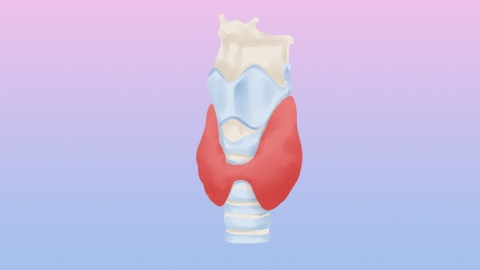Why is thyroglobulin low and thyroid antibodies high?
Generally, low thyroglobulin and high antibodies may be caused by improper diet, strenuous exercise, Hashimoto's thyroiditis, subacute thyroiditis, hyperthyroidism, and other factors. If discomfort symptoms occur, it is recommended to seek timely treatment at a reputable hospital. Detailed explanations are as follows:
1. Improper Diet
Long-term insufficient iodine intake or unbalanced nutrition in the diet can affect the normal synthesis function of the thyroid gland, leading to reduced thyroglobulin production. Meanwhile, malnutrition may indirectly impact the immune system, causing abnormal elevation of antibody levels. It is important to adjust the diet structure and ensure balanced nutrition. Under a doctor's guidance, appropriately consume iodine-rich foods such as kelp and nori.
2. Strenuous Exercise
During strenuous exercise, the body is in a state of stress, which may temporarily affect thyroid metabolic function, leading to decreased thyroglobulin synthesis. At the same time, stress may cause brief fluctuations in the immune system, mildly elevating antibody levels, which usually return to normal after rest. Choose moderate-intensity exercises such as jogging or swimming, and avoid high-intensity or prolonged strenuous exercise.

3. Hashimoto's Thyroiditis
Abnormal immune system activity produces antibodies that attack thyroid tissue, causing damage to the thyroid gland, reduced thyroglobulin synthesis, and significantly elevated antibody levels. This may be accompanied by symptoms such as goiter and fatigue. Treatment under a doctor's guidance may include medications like levothyroxine sodium tablets, thyroid tablets, and methylprednisolone tablets.
4. Subacute Thyroiditis
Viral infection can trigger subacute thyroiditis. Inflammation damages thyroid tissue, affecting thyroglobulin synthesis and activating the immune system to produce antibodies, leading to elevated antibody levels. Symptoms may include thyroid pain and fever. In the early stages of the disease, if pain and fever are prominent, medications such as ibuprofen sustained-release capsules, diclofenac sodium enteric-coated tablets, and acetaminophen tablets may be used under a doctor's guidance to alleviate symptoms.
In patients with hyperthyroidism, excessive secretion of thyroid hormones affects the normal structure and function of the thyroid gland, leading to reduced thyroglobulin synthesis. Some patients may experience elevated antibody levels due to immune dysfunction, accompanied by symptoms such as palpitations and excessive sweating. Under a doctor's guidance, medications such as methimazole tablets, propylthiouracil tablets, and metoprolol tartrate tablets may be used for improvement.
In daily life, maintain a regular routine and avoid staying up late; engage in appropriate physical exercise to strengthen the body; and maintain a positive mindset, avoiding excessive tension.






